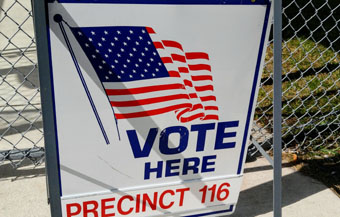
photo courtesy of Thursday Review
Leaked Documents:
Russian Hacking Was More Serious
| published May 6, 2017 |
By Keith H. Roberts, Thursday Review contributor
The widening investigations into the possibility that hackers—presumed to have direct connections to the Russian government—attempted to interfere with the 2016 elections in the U.S., is now moving rapidly into new terrain after revelations on Tuesday that Moscow may have made numerous direct and brazen attempts to breach election systems in the weeks, days and hours before Americans went to the polls.
One of many recent leaked NSA documents alleges that Russian hackers—almost certainly in the employ of the Russian military—sent hundreds of phishing attack emails to elections officials all over the U.S., and made numerous aggressive attempts to breach security for a major government contractor charged with providing voting software and voting machines. The NSA documents also reveal that U.S. and international intelligence experts now believe that the extent of Russian hacking went much deeper than has been previously reported by the CIA, the FBI or the NSA.
Cyber experts concede that among the newly examined information is definitive evidence that Russian hackers used sophisticated digital tools and uniquely-crafted code in an attempt to breach voting systems, software and hardware, and penetrate state and county data collection systems in the days and hours prior to Tuesday, November 8.
The leaked documents stop short of declaring if the hackers were successful in altering the outcome of the vote, or if the cyber-criminals even had a particular preference in the outcome of the election. And the newly available material also fails to provide any evidence that Russian hackers actually altered the outcome of any votes in any county or state.
Still, experts say that the documents show that the U.S. intelligence community may have been blindsided by the extent of the penetration by Russian hackers into the databases, networks and computer operations of voting systems and contractors across the country. The new material also confirms the suspicion by some cyber and intelligence experts that Russian President Vladimir Putin personally directed the cyber operations against the U.S., and that much of the election data breach was the work of the GRU, Moscow’s military intelligence organization.
The revelations come just as Washington prefers to brace itself for testimony by recently-ousted FBI Director James Comey—a potentially explosive Q&A which may include Comey’s direct thoughts not only on his firing by President Donald Trump, but also his understanding of the true depths of possible Russian interference in the 2016 elections.
The latest wrinkle in the expanding controversy came after an Augusta, Georgia woman named Reality Leigh Winner allegedly leaked the information to the web news service The Intercept, which published portions of the leaked documents earlier this week. Winner is a contractor with Pluribus International, where she was working when she apparently made photocopies of the sensitive information, then sent it to reporters with The Intercept.
Winner, as it turns out, has only been with Pluribus—a government contractor charged with, among other things, the dissemination of classified NSA and CIA materials—since February of this year, though she has had one form or another of top secret clearance for more than two years. While in the U.S. Air Force for more than six years, Winner received extensive language training—some of it through the Defense Language Institute—for the purposes of military intelligence. In addition to her native English, Winner is moderately fluent in both Farsi and Pashto.
Initial reports seem to indicate that Winner had no particular political affiliation, other than some posts on social media which were critical of Donald Trump both as candidate and later as President. After The Intercept contacted the NSA for comment about their pending article last weekend, investigators narrowed the list of those who had access to both the data and company printers to a mere six people. From there, investigators quickly followed Winner’s email and digital footprint, discovering her direct link to The Intercept. Unlike NSA contractor Edward Snowden, who used a small thumb drive to copy materials, Winner used a desktop printer and copier which imprinted a small, digital watermark unique to that printing station. Verbatim images of those partially redacted documents published on The Intercept revealed those same watermarks and pointed investigators to Winner.
The explosive new revelations come at an awkward time for Trump and the White House, since the date of the NSA materials coincide precisely with the brief run-up to Comey’s dismissal in early May, a few days after the same NSA materials were given to Trump in a national security briefing. Some in Congress suggest that this is no coincidence, and that President Trump’s firing of Comey was meant to nip in the bud an investigation only days away from inevitable expansion.
Even if true, however, Comey may prefer to avoid altogether answering questions about the newly leaked documents, since the material is still considered classified despite its being made public on the internet.
In the meantime, the White House says it would like to see the business of Washington move forward, and quickly past the issue of Russian interference in the 2016 elections.
Related Thursday Review articles:
Comey Dismissal Sparks Outrage in Congress; Thursday Review editors; Thursday Review; May 10, 2017.
Flynn Lied to Federal Investigators on Russia Probe; Keith H. Roberts; Thursday Review; May 22, 2017.
